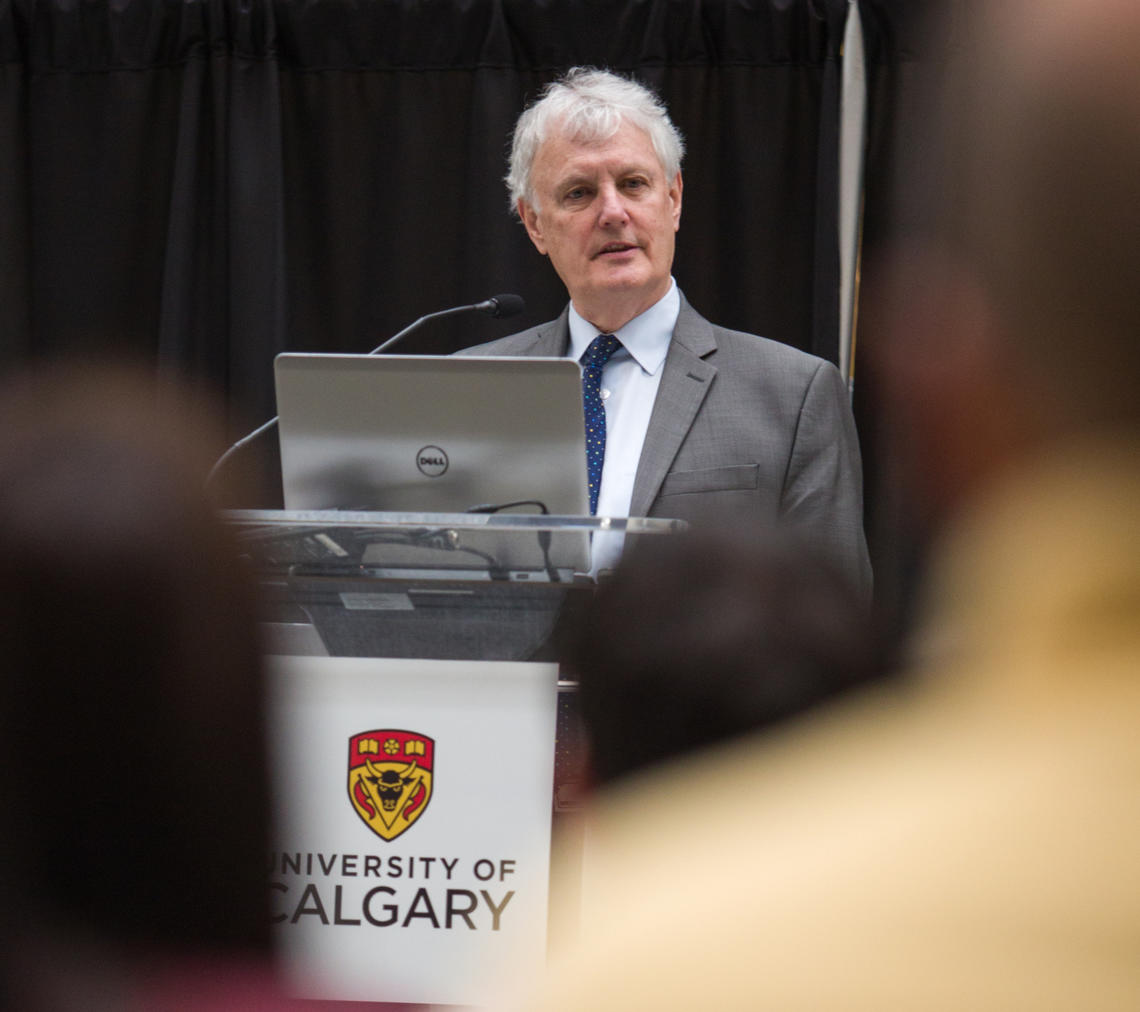
John Reynolds emcees an event hosted by the O'Brien Institute for Public Health.
University of Calgary
July 25, 2018

John Reynolds emcees an event hosted by the O'Brien Institute for Public Health.
University of Calgary
When John Reynolds retires later this year, he might leave campus, but the communities that he built will continue to thrive in his absence. The teams he led are infused with his dedication and compassion, and his leadership has left a strong impression on his colleagues. Reynolds is retiring after 35 years of teaching, research, and administration at the University of Calgary.
Dr. John Reynolds, PhD, joined the university in 1983 as an assistant professor in physiology and biophysics. His lab focused on immunology and the development of B lymphocytes, a type of white blood cell in the adaptive immune system. Reynolds joined the Gastrointestinal Research Group and the Immunology Research Group early in his tenure, serving as chair and providing guidance to colleagues.
“John has a thoughtful, quiet, and insightful way of leading,” says Dr. Jon Meddings, dean of the Cumming School of Medicine (CSM) and one of Reynolds’ longtime colleagues. “He is who you would go to for wisdom and advice.” Reynolds recognized the university’s potential to be a hub for gastrointestinal research, and aided in recruiting promising scholars to build additional, more diverse research capacity. In 2012, the inflammatory bowel disease research unit was recognized as one of the top five in the world.
Reynolds served as head of the Department of Cell Biology and Anatomy from 1999 to 2004, and associate dean (basic research) in the Faculty of Medicine (now CSM) from 2005 to 2013. During that time, Reynolds spearheaded pioneering initiatives that were fundamental to the future successes of the Cumming School of Medicine.
“It’s difficult to summarize his career, because he’s done so many different things,” says Dr. Benedikt Hallgrimsson, PhD, professor in the Department of Cell Biology and Anatomy. Hallgrimsson cites Reynolds’ contributions to the development of core facilities, his support of education (in particular anatomy teaching), and his active recruitment and development of faculty as notable accomplishments.
“He is a very collegial, inclusive, and community-minded person,” Hallgrimsson continues. “John cares about the people he works with, and that’s very evident in everything he does. Being a builder of a supportive and rich communities defines him as a leader.”
In 2013, vice-president (research) Ed McCauley was looking to expand his leadership team. “When Ed was looking for a new associate vice-president, I reluctantly suggested John. I didn’t want to give him up!” says Meddings.
Reynolds’ reputation as an innovative leader preceded him, and McCauley was quick to ask Reynolds to join him. “I saw what John had accomplished in Medicine, and I knew that the university would benefit greatly having him in a larger leadership role,” says McCauley.
As associate vice-president (research) and director of Research Services, Reynolds was empathetic to the challenges faced by researchers and administrators. “Having been a researcher and an associate dean, he really brought both perspectives to the role,” says Lorna Very, director of grants, awards and ethics in Research Services.
Balancing the worlds of research and administration was at the heart of Reynolds’ work in Research Services, focused on projects with communication and co-operation at their core. While leading the Research Management System and IRISS update initiatives, Reynolds prioritized efficiency and transparency. Reynolds knew that these systems had to be easy to use and function seamlessly to relieve the burden of paperwork and complex processes for both researchers and administrators, so he championed user experience throughout the projects.
This combination of traits — his drive, thoroughness, and thoughtfulness — have enabled the communities he led to thrive. “You can see the impact of John’s leadership in all groups that he has been part of,” says McCauley. “They operate with a level of dedication and commitment to the greater good that inspires others. It has been a privilege to work alongside him for the past five years.”